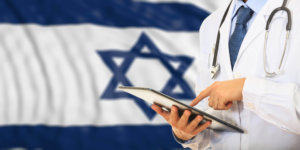We could also have titled this article ‘How does Israel ensure the quality of the drugs it exports’. We at IsraelPharm, as a licensed pharmacy under the supervision of the Israeli Ministry of Health, are committed to providing our customers only with the highest quality and most effective medications that are permitted to be sold in Israel.
Your faith in the quality and professionalism of IsraelPharm is justified by our complete commitment to both the letter and the spirit of the laws governing the sale of pharmaceutical products in Israel. We will explain how these are some of the very highest standards in the world.
How does Israel regulate the manufacture or sourcing of medications sold here?

Inside the Ministry of Health, several specialized divisions ensure the quality and safety of all medications sold or exported from Israel.
The ministry controls every aspect of production, importation and sale of pharmaceuticals, with an entire body of legislation that empowers it to inspect premises, bills of lading, ingredients, documentation and anything else that can contribute to the manufacture or sale of medicines.
The Pharmaceutical Division is the authority responsible for controlling medical and pharmaceutical products, cosmetics, clinical experimentation on humans, prevention of pharmaceutical crime, and the pharmaceutical services in Israel.
The special divisions inside the division are charged with supervising clinical experimentation, pharmacological products, the standardization and control of pharmaceuticals, medicines registration, import of pharmaceuticals and drugs, pharmaceutical monitoring, pharmacovigilance and drug information.
Its main task is to ensure that all of the drugs in the market meet the applicable standards in terms of safety, quality and efficacy and that the medical and pharmacological products comply with the quality and safety requirements.
It is responsible for
- enforcement of the standards applicable to medical products
- promotes the intelligent use of the drugs
- developing the national medication policy and the pharmaceutical services policy
- forming an essential component in the implementation of the national health policy.
The division is responsible for applying the ministry’s policy in all matters concerning the pharmacological profession, medical and pharmaceutical preparations – registration, licensing, legislation, control, information, training and consulting.
The Medical Preparations Registration department deals with the registration of medicines in Israel. According to the legislation, a medicine can be registered in the National Drugs Registry only after its safety, efficacy and quality have been proved after a proper, thorough and critical assessment of the information submitted about the medicine. Registration is intended to protect public health and constitutes a barrier to the marketing of poor quality and dangerous medicines. Registration enables physicians to prescribe medicines to their patients with confidence. The Registration Department is responsible for establishing and maintaining a central Drug Registry.
The Pharmaceutical Division is the national body responsible for the national drug register. For this purpose, it maintains a national registry system. It evaluates drugs for registration, cooperates with the medical substance standards and auditing institute, performs risk assessments for approval of clinical tests, and controls and supervises pharmacies.
The Ministry of Health has set up the Institute for Standardization and Control of Pharmaceuticals that is responsible for ensuring the quality of medicines marketed in Israel. It supervises biological and chemical drugs intended for human use, both locally manufactured and imported.
The Institute’s activities include:
- Supervision of pharmaceutical plants
- Laboratory testing of medicines
- Assessment of data regarding the quality of medicines submitted for licensing in Israel.
There is also a Quality Assurance Unit in the Institute that operates with the objective of ensuring that all the Institute’s processes and activities are carried out at the required standards of quality.
The Pharmacovigilance and Drug Information department’s objective is to ensure the safety of drug treatment in Israel by collecting safety information regarding all medicines sold. Adverse event reports and safety information are received from pharmaceutical companies, the general public, and healthcare practitioners.
How does the Ministry of Health regulate the sale of medicines in Israel?
Pharmacies in Israel are only allowed to sell drugs that are listed in the National Drugs Registry. They must conform to the stipulations in the registry in terms of the requirements for proper prescriptions from a licensed physician, quantities and strengths permitted and many other restrictions.
As defined in the legislation, the retail dispensing of both prescription medicinal products and of most non-prescription over-the-counter (OTC) drugs can only be made by a registered pharmacist and in a pharmacy (Pharmacists Regulations Act 2004). Only products that are specifically listed in the Regulations (general sale list drugs) Schedule can be dispensed in a pharmacy by a non-pharmacist or in a non-pharmacy business, and then only with a permit from the Ministry of Health.
There are also specific regulations for the sale of medicinal products on the internet, by e-mail and by mail order.
An Israeli pharmacy like IsraelPharm can operate its website for the online retail dispensing of pharmaceutical products only after obtaining approval from the Ministry of Health and in accordance with the provisions of the required procedures. There are regular inspections of the premises and monitoring of business records. The pharmacy can operate its website only if it operates as a retail pharmacy as well.
FAQ
Do Israel and the EU share pharmaceutical standards?
The European Union (EU) has an agreement with Israel on conformity assessment and acceptance of pharmaceutical products. This agreement recognizes Israel’s standards as being equivalent to European standards. It covers human medicinal products, active pharmaceutical ingredients and excipients and procedures related to good manufacturing practice (GMP).
The agreement came into force in January 2013, after Israel implemented the relevant EU legislation and aligned its GMP standards, inspection procedures and forms to those used in the EU.
Are generic medicines less effective than FDA approved branded ones?
The US Food and Drug Administration (FDA) stipulates that any generic drug must be as safe and effective as the equivalent brand-name drug before it will give permission for its sale.
A generic drug is a copy of a brand-name drug that has exactly the same intended use to produce the same effects, be administered via the same route and in the same dosage as
the original drug. The company producing the generic must have conducted trials and report the same side effects, risks, safety, and strength.
In other words, their pharmacological effects must be precisely the same as those of their brand-name counterparts. Suppose you are concerned because the generic drugs you are getting from IsraelPharm are so much cheaper than the brand-name equivalents. In that case, you can rest assured that this is not because of any compromises in quality or effectiveness. It is primarily a case of the original patent held by the inventor of the drug having run out, which means they no longer have the sole rights to manufacture it. While holding the patent, they can charge whatever price they like because competition is impossible.
Are IsraelPharm’s generic medicines as good as the branded ones being prescribed?
Thanks to the famous characteristic of the “start-up nation” Israel has for over three decades led the world in many fields, especially in the production of generic drugs, in which it became the leader. Generic medicines (GM) provide patients with medical treatment that is as effective as brand-name products but less expensive. During the last few decades, generic substitution became important in promoting the use of less expensive medication and is in use all across the USA and in over 30 countries in Europe.
Using a generic is a voluntary decision – you or your physician can prohibit or decline substitution and we will comply. The value of substitution has been clearly shown by our price comparison showing savings of up to 70% on our generics when compared to branded names.
With our commitment to generic brands, we hope to reduce our customers’ medicine costs and increase price competition between pharmaceutical companies.

















